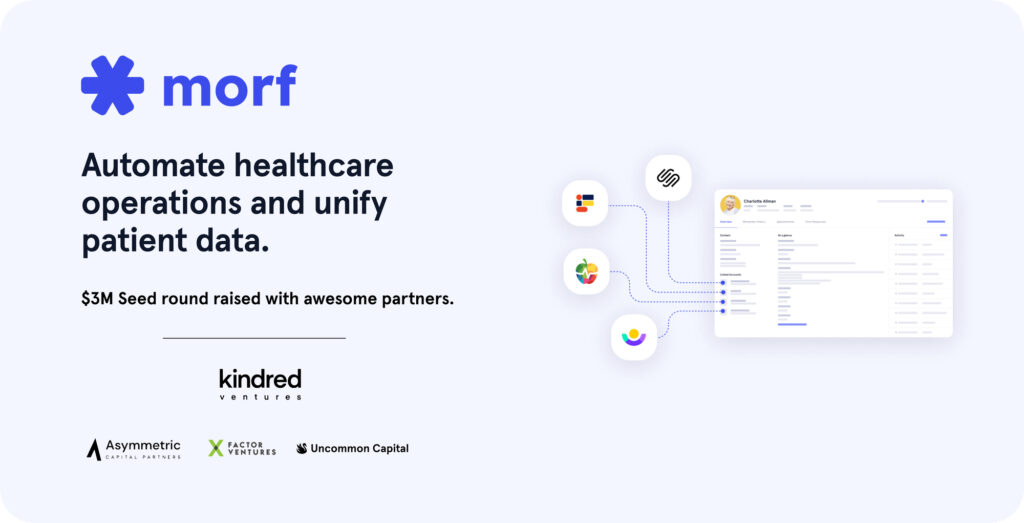Morf Health, an integrated digital healthcare platform specializing in optimizing healthcare operations, recently announced a successful seed financing round, raising $3 million. This funding effort was led by Kindred Ventures and with participation from Uncommon Capital and Asymmetric Capital Partners.
Guided by Montana Scher and James Thompson, Morf Health empowers providers to synchronize patient data, establish a cohesive patient view and construct tailored workflows for operational efficiency, thereby minimizing administrative burdens. Both founders served as product and engineering partners at Parsley Health and realized the challenges in integrating healthcare and technology.
“When you look under the hood, it’s remarkable how much duct tape and glue is required to support healthcare delivery today and how difficult it is to track patient progress. We’re building Morf to make it easy for healthcare providers to harness technology for efficient operations, personalized patient experiences and health outcomes tracking,” said Montana in the press release. They also expressed gratitude to Uncommon Capital, X Factor Ventures, Asymmetric Capital Partners and their angel investors.
Morf’s journey began as part of the Y Combinator summer 2022 cohort, leading to the rollout of its beta program. Over the past year, Morf has collaborated closely with healthcare providers, enhancing the onboarding experience for over 10,000 patients.
Morf’s platform allows for flexible integration with diverse tools, ensuring healthcare providers can effortlessly tailor their workflows to meet changing demands. This integration extends to electronic health records (EHR), enabling efficient care delivery and operational management. Serving as an integration platform, Morf guarantees seamless communication and synchronization among all these tools, including the EHR, by unifying their data.
XTALKS WEBINAR: Personalizing Healthcare with Digital Technologies
Live and On-Demand: Monday, December 4, 2023, at 11am EST (4pm GMT/UK)
Register for this free webinar to gain insights into the practical paradigm shift in personalized healthcare with personalizing digital biomarkers and healthcare management.
Challenges in Healthcare Operations
The healthcare industry is undergoing a rapid and substantial expansion. Surprisingly, administrative costs comprise a considerable segment, comprising 34 percent of the overall healthcare expenditures in the US.
In this dynamic environment, healthcare administrators grapple with a multitude of daily challenges, including rising costs, regulatory changes, operational obstacles, security requirements and the transformative influence of advanced technologies. Even lower-tech health providers feel the pressure of a tremendous amount of admin work required to run a healthcare practice.
Additionally, digital technologies have permeated nearly every facet of the healthcare industry. Efficient use of information gathered from digital health tools requires avoiding the pitfalls of getting lost in vast data. To address this challenge, a critical approach involves centralizing and integrating all information into a single, cohesive platform.
Morf’s platform manages patient data collection, reconciliation and activation across a provider’s entire tech stack.
Morph faces stiff competition from companies like Healthverity and Phrasehealth offering similar services. Several other prominent entities dominate the digital healthcare landscape, enjoying support from industry giants such as Amazon, Google and GE Healthcare. However, startups like Tendo, Luma Health and Upfront Healthcare are also experiencing substantial growth.
In 2022, the digital health market in the US reached a valuation of $77.0 billion, with a projected compound annual growth rate (CAGR) of 17.10 percent anticipated from 2023 to 2030.












Join or login to leave a comment
JOIN LOGIN